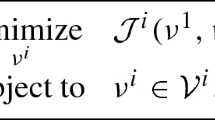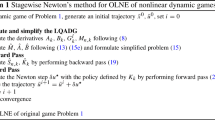Abstract
In this paper, we provide new results on conditions for the existence of open-loop Nash equilibria in discrete time dynamic games (DTDGs) using the theory of generalized Nash games. We use the state conjecture formulation of DTDGs introduced in Abraham and Kulkarni (Under Rev Math Methods Oper Res, 2017) for the analysis, which transforms a DTDG into an equivalent generalized Nash game. The existence of a Nash equilibrium for a generalized Nash game is intractable in general, without strong assumptions in the problem structure. We introduce a new and related game called the DTDG with consistent conjectures, which has a shared constraint structure unlike the original game. We show that an open-loop Nash equilibrium of the original DTDG is a Nash equilibrium of this new game, and hence, the existence of a Nash equilibrium for the DTDG with consistent conjectures becomes necessary for the existence of an open-loop Nash equilibrium in the original DTDG. Then we show that when the cost function of the game admits a potential function, the existence of a Nash equilibrium in the DTDG with consistent conjectures follows under mild assumptions. Finally, we show a reverse relation, wherein under certain conditions, a Nash equilibrium of the DTDG with consistent conjectures is shown to be an \(\epsilon \)-Nash equilibrium of the original game. We use an example from dynamic duopoly competition with sticky prices to illustrate the concepts and results.



Similar content being viewed by others
References
Abraham MP, Kulkarni AA (2017) New results on the existence of open loop Nash equilibria in discrete time dynamic games via generalized Nash games, Under review with Mathematical Methods of Operations Research
Başar T, Olsder G (1999) Dynamic Noncooperative Game Theory. Classics in Applied Mathematics, SIAM, Philadelphia
Beck A (2014) Introduction to Nonlinear Optimization: Theory, Algorithms, and Applications with MATLAB, SIAM
Bylka S, Ambroszkiewicz S, Komar J (2000) Discrete time dynamic game model for price competition in an oligopoly. Ann Oper Res 97:69–89
Di Pillo G, Grippo L (1989) Exact penalty functions in constrained optimization. SIAM J Control Optim 27:1333–1360
Dockner E (2000) Differential games in economics and management science. Cambridge University Press, Cambridge
Engwerda J (2005) LQ dynamic optimization and differential games. Wiley, New York
Facchinei F, Fischer A, Piccialli V (2007) On generalized Nash games and variational inequalities. Oper Res Lett 35:159–164
Fershtman C, Kamien MI (1987) Dynamic duopolistic competition with sticky prices. Econometrica: J Econom Soc 1151–1164
Haurie A, Krawczyk JB, Zaccour G et al (2012) Games and dynamic games. World Scientific Books, New Jersey
Jank G, Abou-Kandil H (2003) Existence and uniqueness of open-loop Nash equilibria in linear-quadratic discrete time games. IEEE Trans Autom Control 48:267–271
Kannan A, Zavala VM (2011) A game-theoretical model predictive control framework for electricity markets, In: 49th Annual Allerton Conference on Communication, Control, and Computing, IEEE, pp. 1280–1285
Kulkarni AA, Shanbhag UV (2012) On the variational equilibrium as a refinement of the generalized Nash equilibrium. Automatica 48:45–55
Kulkarni AA, Shanbhag UV (2012) Revisiting generalized Nash games and variational inequalities. J Optim Theory Appl 154:1–12
Kulkarni AA, Shanbhag UV (2013) On the consistency of leaders’ conjectures in hierarchical games, 2013 IEEE 52nd Annual Conference on Decision and Control (CDC), pp. 1180–1185
Monderer D, Shapley LS (1996) Potential games. Games Econom Behav 14:124–143
Nocedal J, Wright SJ (1999) Numerical optimization, springer series in operations research. Springer-Verlag, New York
Reddy PV, Zaccour G (2015) Open loop Nash equilibria in a class of linear quadratic difference games with constraints. IEEE Trans Autom Control 60:2559–2564
Rosen JB (1965) Existence and uniqueness of equilibrium points for concave \({N}\)-person games. Econometrica 33:520–534
Van Long N (2010) A survey of dynamic games in economics. World Scientific, Singapore
Acknowledgements
Funding was provided by Science and Engineering Research Board.
Author information
Authors and Affiliations
Corresponding author
Rights and permissions
About this article
Cite this article
Abraham, M.P., Kulkarni, A.A. An Approach Based on Generalized Nash Games and Shared Constraints for Discrete Time Dynamic Games. Dyn Games Appl 8, 641–670 (2018). https://doi.org/10.1007/s13235-017-0231-9
Published:
Issue Date:
DOI: https://doi.org/10.1007/s13235-017-0231-9




